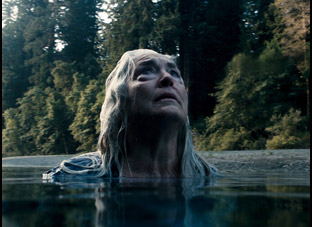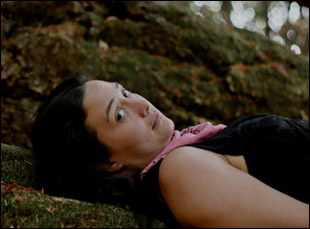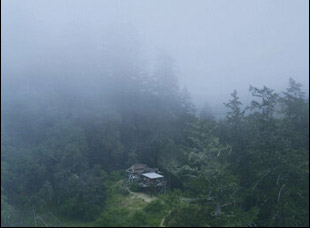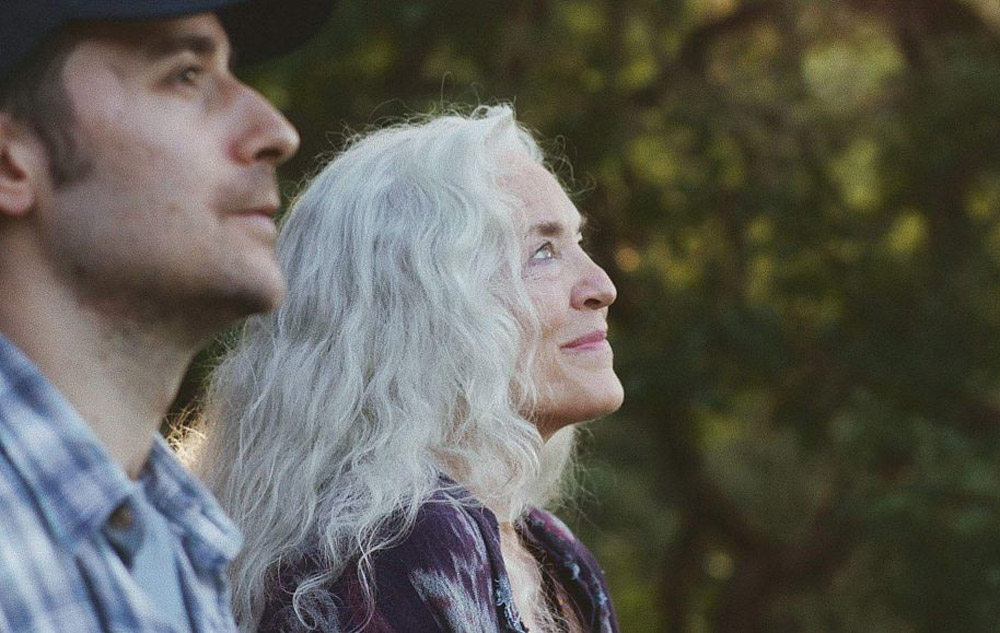If Mario Furloni and Kate McLean were going to tell the story of a woman who had created a slice of heaven for herself in the hills of Humboldt County in their narrative feature debut “Freeland,” they were intent on giving that same experience to their crew.
“We ate every meal together and we spent a lot of time together,” says Furloni, of creating a communal atmosphere that could blend art and life in a way that they were used to as documentarians. “That time was really particularly effervescent and a time when ideas came and we could talk about them without the pressure of the time constraint of being on set. It really helped in so many ways.”
It’s not always the case that the spirit behind the film ends up on screen, but you feel that it does in “Freeland,” which drifts off the screen like a refreshingly cool breeze even as it takes audiences down most treacherous path for its lead Devi (a radiant Krisha Fairchild), a marijuana farmer who has been wise to stay just beneath the radar of both authorities and others in her field to live a life of comfort. Ironically, it’s when there’s no longer a reason to hide that Devi feels threatened, with California’s legalization of pot allowing for corporate farmers coming into the fold and new regulations being enforced that are at odds with the way she’s always done things, putting both herself and her employees (a motley crew comprised of the wily Lily Gladstone, Cameron James and Frank Mosley) in jeopardy.
As Furloni and McLean express so beautifully in following up their short 2012 doc “Pot Country,” which detailed how hippies came to run the roost in the boonies of Northern California, largely left alone to create a utopia of sustainability they could hardly find in the cities and the suburbs, it isn’t so much her business that feels under attack as a personal ethos and Fairchild gives the kind of dazzling, soulful performance as Devi that lets all that history play out on her face, proud and unbowed even as the odds are increasingly stacked against her. The film has faced steep odds itself in getting to audiences after a planned premiere at SXSW was cancelled as a result of the coronavirus and “Freeland” has been rerouted onto the festival circuit that has migrated online, but like its heroine, it has been fighting hard for its place in the world, finally premiering physically at the Sidewalk Film Festival in Birmingham, Alabama on August 26th where a pop-up drive-in has been set up, leading into a number of dates where you can catch one of the year’s best films virtually.
Shortly before the film’s Sidewalk screening, Furloni and McLean graciously took the time to talk about how setting up a special environment on set led to the making of such a special film, building upon their skills as documentarians to bring a realism to the drama, and how the changes in California marjiuana laws affected the development of the story.

Mario Furloni: We made “Pot Country” and then we kept working together in various capacities and we’re very good friends, so we’d get together and talk about our time making “Pot Country” and the people we met there. We starting dreaming about, “Oh, there’s another film there. Is it better as a fiction or as a doc?” And then we decided to do it as a scripted film [because] we knew we wanted to have this character that was an older grower who is experiencing this change in life. For a long time, it was a mother/daughter story and it went through so many different iterations. Finally, we found it in some ways like let’s bring this story down to its minimal viable mode and [ask ourselves] really what is the core of this? Who is the core character to really focus on?
Kate McLean: And we had Krisha [Fairchild] in mind for the mother when it was a mother/daughter story. Our amazing producer Laura Heberton had put her name forward and Mario and I saw “Krisha,” and we’re like, “Oh, she can carry a whole film.” As we moved towards a smaller [scale] script, it was clear that the person that could make a small documentary-style film in this way that was really about this dilemma around legalization work and appear in every single scene was going to be Krisha. We were so lucky to have her.
What was it like developing this alongside the evolution the marijuana business in California as it was being legalized? It really does present a sea change for this character to go through.
Kate McLean: When Mario and I made “Pot Country,” there was a legalization initiative on the ballot and it didn’t succeed, but we watched people in that universe grapple with the changes that they knew that would bring. We knew the fear and also the signs of the semi-legal medical marijuana marketplace in the streets already taking people who had been in the black market business for many years and pushing them into the increasingly unfamiliar territory that was difficult for them. Out of that, we could see the seeds for where things were going and as time went on and we were still dreaming about the movie, we continued to see these changes building up. It was just clear it was going to be a tidal wave to crash and it was just going to be really difficult for a lot of people to sustain and over time, the script was really transformed to focus on that dilemma because it’s really dramatic and fascinating. We had to do something else that explicitly dealt with it.

Mario Furloni: It was a fascinating process for us because we presented Krisha, for instance, [with], “Listen, your character goes from A to B, and here are some basic ideas that we’ve gathered around people that we’ve met and we knew it’s someone who had built a life of great independence for herself, someone very resilient, but then we said within that, there’s so much richness to bring and we welcome you bringing that. So we would talk [over the character] and in the cases where there was something that didn’t fit for whatever reason, we would talk about it and explain why it wouldn’t fit and sometimes we would convince [her] and vice versa, but for the most part, if it fit within the story, we would welcome any richness they would bring.
Sometimes it didn’t make it into the movie — Krisha [created] a whole universe of the dogs that Devi has had in her life that never made it into the film, partially because working with an animal was beyond what we could do. [laughs] To get really nerdy about it, you can see in the home screen of her phone the dog that died, so there are all these things that are internal and some of them came through explicitly in the film and some of them are implicit, but all of it helps to create what we’re accustomed to with documentary, where it’s like you show up and that person is real. You don’t have to do that in documentary, [but on a narrative] what you’re trying to do instead is make them comfortable in front of the camera, so we were really trying to play to our strengths as transitioning from working in docs to making a first fiction feature.
You also have this amazing central location that likely added to the reality of the scenario. How did you find it?
Kate McLean: We were in a pretty rural community where there’s not a huge presence of AirBNBs, but we were working with Claire Weissbluth, an editor and a filmmaker in the Bay Area where Mario and I now live and had grown up in that community. Claire was a utility player linchpin of our filmmaking process in so many ways – everything from like, “Oh, you have this detail wrong in the script” to “how are we going to get these trimming tools that we’re going to need” to location scouting, and she went up and did several scouts for us as we thought about where the crew was going to be. We knew what we needed was a big, comfortable unfussy sort of a house, some place beautiful and relaxing with enough nooks and crannies that we could tuck most of the cast and crew into various places around it. Claire came back, with this lovely local woman who basically rented us her house and [she] stayed with family [during the shoot], so it was the kind of arrangement that we never could’ve made without someone that was deeply ensconced in this place to help navigate it for us.
It was this gorgeous house that was right on the Eel River, which runs right through that town and in the evenings, we could sit by the water and listen to the frogs and we had another house where some of the other cast members stayed a block or two away, so we could always have dinner together. In an experience when every other aspect of the work can be really hard, having that extra time and effort to make sure that people are well-fed and comfortable and have nice unstructured time to relax becomes a really important aspect of making your shoot feel happy and build a team that is working well together. Catering really helped us out.

Kate McLean: We were graciously welcomed onto a legal and permitted farm where we shot our trim scenes and due to a miscommunication, work was in session there that day. There was a bunch of fresh weed that needed to get trimmed and once the plant gets cut down and the process is underway, you can’t stop really, or you shouldn’t. You need to push through things and get it taken care of or it costs people money and it screws things up, so suddenly [we] went from having this empty set at our disposal to like, “Oh, we’re going to have to change our shooting schedule,” which was going to be a real catastrophe, or we’re going to have to incorporate this work that’s going on.”
That was a very happy accident that we got these incredible, very experienced people who were working around us and they basically just let us tuck the actors in around their table and we shot the scene. And I love that quality that they brought to it where we’re in the middle of their routine and we were living in their world a little bit as we did this and they ended up kind of getting into the process of filming, enjoying the dialogue and laughing at the jokes. Someone even improvised her own dialogue in response and put herself in the scene, which was really fun, so not all of it is in the film, but that feeling of it infused the scene in a really good way.
From what I heard you really gave yourself the freedom to try things out when there were reshoots, which is so rare on a film of this size. Did knowing what the backend process might look like inform how you went about filming?
Mario Furloni: We didn’t know we were going to do a reshoot, but what was pretty pragmatic and careful was to keep our crew very small and all made up of documentary people — every single department was from documentary, so they were all very used to working in this very scrappy way in order to buy us more time. That was always the thinking and to create days that were not too long so we could think and change things as needed and have time after the shoot to process. That allowed us then later to go back, knowing that we could get two more days out of the budget we had.
And we worked with two brilliant editors – our friend Sara Newens, who works mostly in documentary, and then Chris Donlon, who works mostly in fiction, and that combination was quite good for us because we had shot things very loosely, so this combination of having someone who was more familiar with docs helped us give it some initial shape and then Chris came in to give it some of the polish.
It’s got a wonderfully evocative score – what was it like to put music on it?
Mario Furloni: We tortured our composer William Fritch. [laughs] He’s a very good friend of ours and we’ve worked with him for 10 years now. We went through so, so, so many versions of score – he’s a very fast composer, so he kept bringing on this amazing music and we’d try and be like, “Oh, well that’s great,” and he would bring something else and we’d like, “Oh, let’s change everything to match that.” I don’t know if we gave him some traumatic scars from it, but from our end, it was amazing because we’d be like, “Let’s try something and let’s build a whole thing around this instrumentation” and he would try it and then change it again and change it again, so it was quite a process.
Kate McLean: The mode overall for the film was gathering people around us that we trusted and respected and trying to build a space where there was a lot of collaboration and dialogue. We had so many talented people working with us from start to finish that there were lots of opportunities to try scenes in a couple of different ways and then find a third or fourth or fifth articulation in post that we hadn’t thought about before that changed the story in a meaningful way. so people felt empowered to do their best work and when it was working at its best, it was a really exhilarating, fun atmosphere where we could try stuff.
“Freeland” will screen physically at the Sidewalk Film Festival in Birmingham, Alabama on August 25th at 10:30 pm and the Nevada City Film Festival on August 28th, and will be available online as part of the Middlebury Film Festival from August 27th through September 3rd, the Skyline Film Festival from September 10th-13th, and the Filmfort Film Festival from September 24th-26th. A full list of upcoming screenings can be found here.




